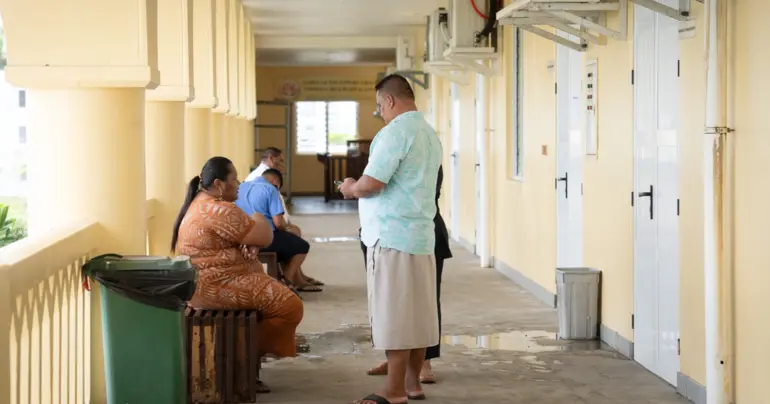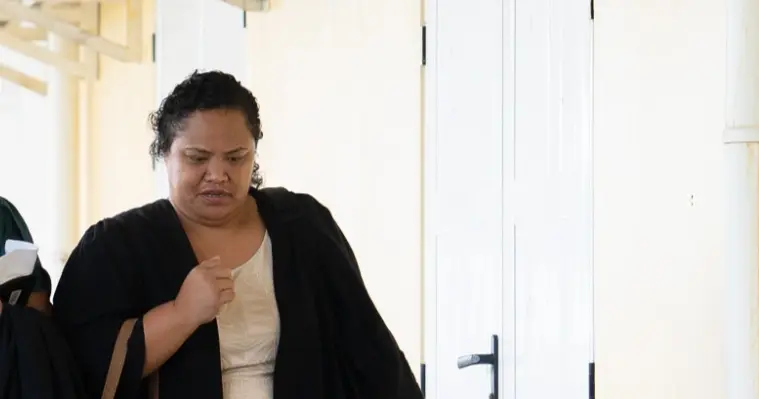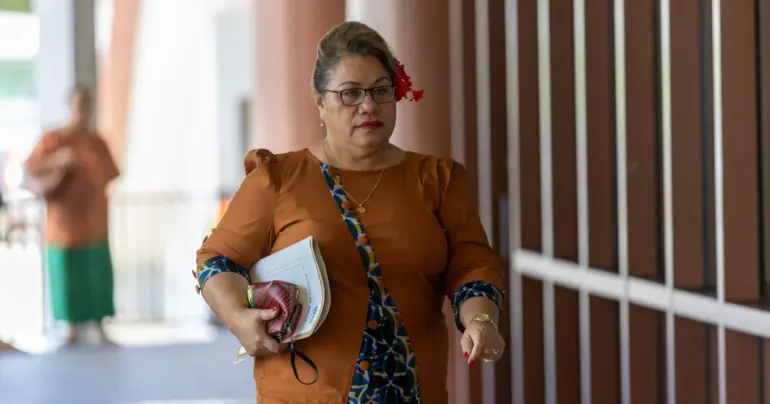New Cocoa Initiative seeks premium markets
 By Sapeer Mayron
•
25 October 2020, 7:00PM
By Sapeer Mayron
•
25 October 2020, 7:00PM
A new training programme is underway to improve the cocoa industry for young farmers, tackling everything from the growing to exporting of one of Samoa’s most loved “superfoods.”
The programme is funded by New Zealand’s Ministry of Foreign Affairs and Trade, and hopes to turn cocoa farming from a largely subsistence industry to one with real commercial success.
S.P.S. Biosecurity is running the three-year initiative. It is an environmental protection organisation based in Auckland.
As well as learning to improve growing and harvesting, as well as making a viable business out of their abundant cocoa farms, the project hopes to change how Samoan farmers process their cocoa for export.
Cocoa farmer Floris Niu, who runs Ms. Sunshine Farms, is the media and agritourism consultant for the project. She said if Samoa’s cocoa quality can improve, the country can tap into a lucrative global market.
“In a nutshell, the average koko grower should be able to create a complete micro-economy from their planting, post-harvest and value adding activities by the end of the three-year initiative,” she said.
Typically, koko Samoa is made by roasting the raw beans of the cocoa fruit, then grinding the roasted beans into a paste.
Growers like Ms. Niu are turning to the more ancient traditions of fermenting the beans for nearly a week before turning them into chocolate, which is what brings out the “unique, fine flavour,” she sid.
“Grassroots growers will find it challenging to transition from old habits of raw bean processing, to the market expectation of five to seven days of fermentation,” she said.
But it is what the niche chocolate industry expects, especially productive clients like Whittakers in New Zealand. Today the company can hardly get enough Samoan beans to meet demand, with its single origin Samoan dark chocolate among its top sellers, according to S.P.S. Biosecurity Director Keith Budd.
“The 70 per cent Cocoa Samoa Smooth Dark Chocolate is one of Whittaker’s top performers in the premium category,” he said.
“Premium cocoa is the fastest growing segment in the chocolate market due to the expansion of specialty or premium chocolate products,” S.P.S. Biosecurity International Programmes Manager Pavel Muron said.
“Most of the Samoan cocoa production has a high potential to achieve premium status due to flavour and origin.”
As well helping growers get more profit from their plantations, the project will also train young growers and female growers to flourish in the industry. The training will include learning more about the origins and flavour of Samoan cocoa.
“It makes sense that growers should be the experts of their own products,” Ms. Niu said.
“Young growers will also participate in a rural youth training programme which is being developed with the assistance of USP and NUS (the University of the South Pacific and the National University of Samoa), Samoan industry leaders and farmers.
“The course is designed to develop transferable agribusiness skills enabling youth to return and engage in Horticulture. It is one thing to own a cocoa plantation but another to turn it into a viable business.”
S.P.S. Biosecurity have been working in the Samoan cocoa industry since 2015, helping Whittakers and Savaii Koko forge their relationship get Samoan chocolate to New Zealand, through the Cocoa Plantation Improvement Programme.
Previously it conducted a cocoa plantation pest survey on Savaii and developed a biosecurity plan to address risks of cocoa pests arriving in Samoa.
The Waikato Institute of Technology (W.I.N.T.E.C.) and Ms. Niu’s farm, Ms. Sunshine Organic Farms in Tuana'i are also part of the project.
For more information on this initiative or how you can join trainings and events, visit https://www.facebook.com/mssunshinefarms, email [email protected] or call 761 4942 (Mon-Fri 9am – 5pm only)
Press Release:
New Cocoa Initiative seeks Premium market for Samoan growers
A new Cocoa Initiative, supported by the Ministry of Foreign Affairs & Trade of New Zealand (Aotearoa), aims to improve the livelihoods of Samoan Koko growers- through specific training that will ensure Improved Protection of the Premium Cocoa Value Chain.
What does this mean for Koko growers?
The initiative should result in a sustained improvement in farmer income; increasing rural employment for youth and women, and an overall increase in environmental and economic resilience.
In a nutshell, the average koko grower should be able to create a complete micro-economy from their planting, post-harvest and value adding activities by the end of the three-year initiative.
With relatively low volumes but a focus on quality, Samoa is uniquely positioned to take advantage of a niche market that would avoid the “subsistence “ level incomes which most cocoa farmers globally are bound to by supplying the commodity market.
What is the Premium Cocoa Value Chain?
Every Samoan believes that Samoan Koko (Trinitario) is far more superior than most. Whether this assumption is by association only, or there is enough scientific, market and anecdotal evidence to support it, Samoans will not budge on the nobility of their iconic Superfood.
Premium Cocoa also points to the processing methodology used to transform this exceptional commodity into superior food. Superior food not only means expensive, but also describes food that contains optimum health and nutritional benefits. Cocoa by-products, value-added products and alternate products such as cocoa agritourism activities, are all important elements of the premium value chain.
How will this initiative benefit the average grower?
By increasing the value of Samoan koko and creating the support mechanisms to maintain it. Theprogramme also focuses on training youth and women so they may consider careers in the cocoa and wider horticultural sectors; developing product tracing and highlighting the origin and flavour characteristics of Samoan koko beans. It makes sense then that growers should be the experts of their own products.
However, grassroots growers will find it challenging to transition from old habits of raw bean processing, to the market expectation of 5-7- days of fermentation. After all, the beans cannot fully develop its unique fine flavour until it is fermented.
Young growers will also participate in a rural youth training programme which is being developed with the assistance of USP and NUS, Samoan industry leaders and farmers. The course is designed to develop transferable agribusiness skills enabling youth to return and engage in Horticulture. It is one thing to own a cocoa plantation but another to turn it into a viable business.
The project is spearheaded by SPS Biosecurity Ltd, an environmental protection organisation based in Auckland, New Zealand. They have a strong history in Samoa’s cocoa industry having laid the foundation for solid partnerships between Whittaker’s Chocolate and Savaii Koko since 2015.
The Samoa Cocoa Export Improvement Programme (SCEIP), a partnership with Whittaker’s Chocolate; Savaii Koko, Itu Asau Cocoa Farmers Association; New Zealand Aid programme and SPS Biosecurity, has been successful in introducing Samoa’s premium chocolate to New Zealand consumers.
Keith Budd, Senior Consultant and SPS Biosecurity Director says; “The 70% Cocoa Samoa Smooth Dark Chocolate is one of Whittaker’s top performers in the premium category.”
“Premium cocoa is the fastest growing segment in the chocolate market due to the expansion of specialty or premium chocolate products. Most of the Samoan cocoa production has a high potential to achieve premium status due to flavour and origin.”, says Pavel Muron, SPS Biosecurity International Programmes Manager.
Although COVID 19 has disrupted plans for the SPS Biosecurity team to visit, the competent team based in Samoa from KVA Consult and Savaii Koko have started the three-year activity. The initiative will take advantage of the infrastructure, synergies and networks already developed by SPS Biosecurity under the SCEIP and previous Whittaker’s commercial programmes in Western Savai’i. It also complements the activities of the Samoan Cocoa Industry Development Initiative (SCIDI) and Samoan Government agricultural programmes and policies.
Other project partners include The Waikato Institute of Technology (WINTEC), the National University of Samoa (NUS), the University of South Pacific (USP) and Ms Sunshine Organic Farms of Tuana'i village.
For more information on this initiative or how you can join trainings & events, please contact us on https://www.facebook.com/mssunshinefarms or email [email protected] or call 761 4942 (Mon-Fri only 9am – 5pm)
Floris Niu
 By Sapeer Mayron
•
25 October 2020, 7:00PM
By Sapeer Mayron
•
25 October 2020, 7:00PM











